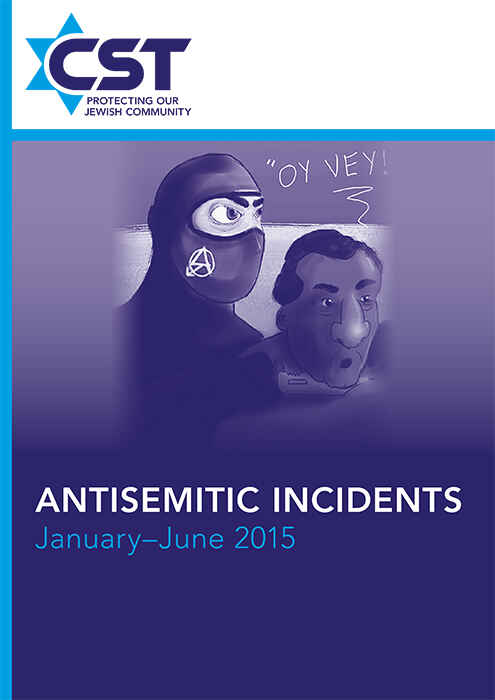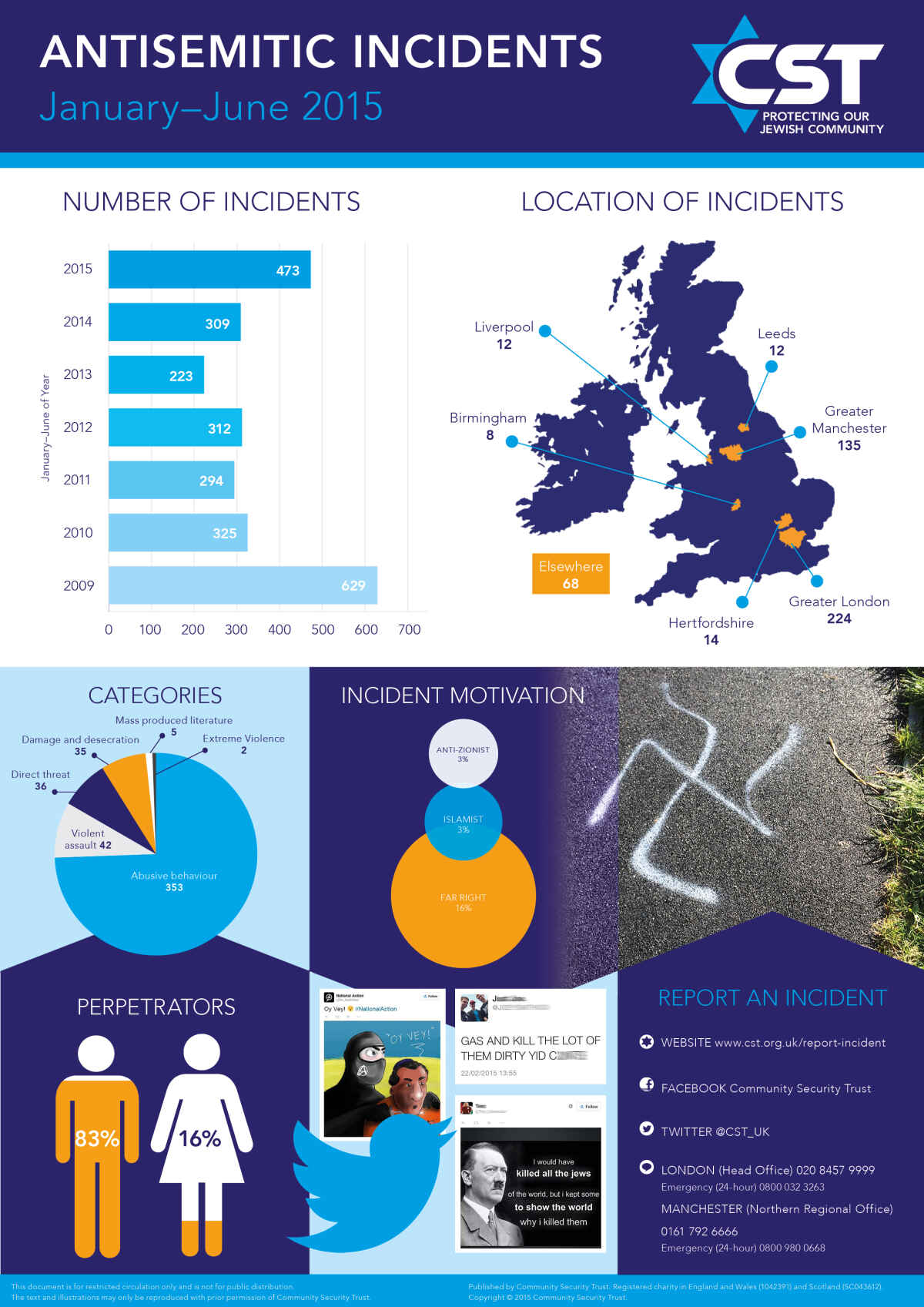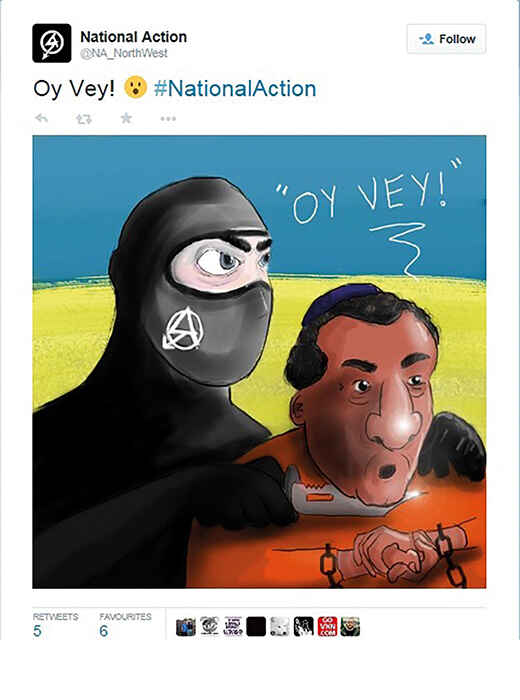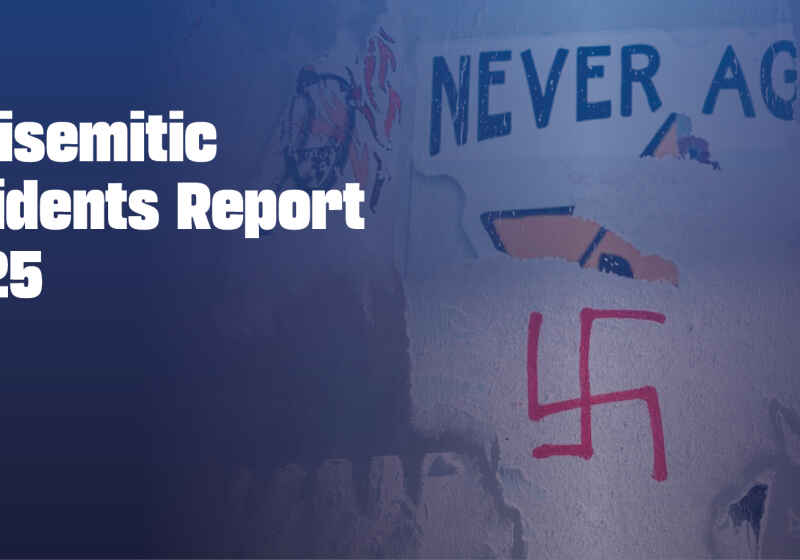CST Blog
Antisemitic incidents rise in UK in first half of 2015
30 July 2015

CST’s Antisemitic Incident Report for January to June 2015, published today, shows a 53% increase in antisemitic incidents compared to the same period last year.
CST recorded 473 antisemitic incidents during the first six months of 2015, compared to 309 antisemitic incidents in the first half of 2014. The 2014 figure was itself an increase of 38 per cent from the 223 antisemitic incidents recorded during the first six months of 2013.
CST has recorded antisemitic incidents since 1984. The highest total CST has ever recorded for the January to June period was 629 incidents in the first half of 2009. In addition to the 473 antisemitic incidents recorded during the first six months of 2015, a further 333 reports were received by CST, but were not deemed to be antisemitic and are not included in this total.
2014 saw the highest ever total recorded by CST for a full calendar year, when 1,174 antisemitic incidents were recorded.
During the first half of 2015, there were:
- 44 violent antisemitic assaults, two of which were classified as ‘Extreme Violence’, meaning that they involved grievous bodily harm (GBH) or a threat to life
- 35 incidents of damage and desecration of Jewish property
- 36 direct antisemitic threats
- 5 cases of mass-mailed antisemitic leaflets or emails
- 353 incidents of abusive behaviour, including verbal abuse, antisemitic graffiti, antisemitic abuse via social media and one-off cases of hate-mail.

Detailed analysis of the timing, content and sources of every one of these recorded antisemitic incidents suggests that, while they may partly reflect a real rise in incident levels, the primary explanation for the rise is most likely to be a greater willingness by people to report antisemitism, either to CST or Police.
The increase mainly occurred in January, February and March, with those months twice as bad as in 2014. That was when British Jews felt especially concerned by antisemitism, seeing awful terrorist attacks in Paris and Copenhagen; and experiencing sustained local, national and global media coverage of the subject of antisemitism. January saw 106 antisemitic incidents reported to CST, the sixth-highest monthly total since CST began recording antisemitic incidents.
The increase in antisemitic incidents recorded during this period did not show the usual features of previous ‘trigger events’. The total did not rise sharply after the attacks in Paris and Copenhagen, nor did a significant number of the incidents make reference to those attacks. Instead, there was a gradual increase in the number of reported incidents of all kinds during that period, and then a gradual decline back to normal levels during April, May and June.
CST did its utmost to remain sober and focussed throughout this, seeking no publicity for ourselves, or our community, believing it would only bring further unhelpful pressure and hype. Instead, we worked with government to organise unprecedented security guarding across our community. This is now being delivered in partnership with literally hundreds of communal organisations and buildings throughout Britain.
At this time, our community also stepped forward. Hundreds of new recruits joined CST’s security teams, and our front line security budget significantly increased thanks to the commitment of donors, old and new.
We welcome the apparent increase in reporting of antisemitic incidents but regret the concern and anxiety about antisemitism that this reflects. CST, our communal partners, Police and government need to know the facts, so that we can best support our community now and in an uncertain future.

Read More

Antisemitic Incidents Report 2025
11 February 2026

Antisemitic Incidents Report January-June 2025
6 August 2025

Love since 7 October
14 February 2025